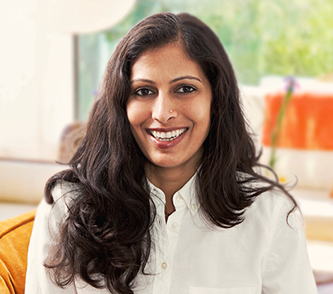For the last ten years, I’ve had a love hate relationship with the entire idea of what nurturing means and how it applies to me. Coming into my own thoughts about nurturing has been a long and interesting journey, and I’ve learned a lot about what it really is and my relationship to it.
I am a second-generation immigrant. My parents came from India to North America in their 20s to give their future children opportunity. What I didn’t realize is that there were expectations that came along with this opportunity. From young adulthood on, I knew to be grateful for the opportunities given. I also realized they came with expectations that I was groomed to meet. These expectations were almost insurmountable: basically, I was expected to become a brilliant doctor/lawyer/engineer/etc., plus be a perfect Indian wife, daughter-in-law, and mother.
Taking on the opportunities gifted to me, and the expectations that went along with them, meant I would have to nurture those who had made them possible by showing up to meet those expectations. Additionally, many of the expectations were actually for me to nurture others in the way my community understood nurturing to be. What gets to me is that these expectations had nothing to do with how well I nurtured my loved ones, but more about protecting my family from “what other people would say.”
Growing up, I looked for role models to model myself on: Indian women who had perfectly acculturated to North American culture while retaining their South Asian values. Not finding any who met all the criteria, I looked to the TV moms of my generation: Maggie Seaver, Claire Huxtable, and Elyse Keaton, and mentally fused them to Indian soap opera characters like Kkusum who embodied South Asian traditionalism and family values (but without all the extra drama of forced marriages, infidelity, and brain tumors).
I do want to note that it’s not just the Indian community that places these expectations of nurturing. Through conversations with friends and clients from various backgrounds, I’ve seen how these expectations exist in many cultures. The specifics of the expectations look different, but they do exist.
Even though I couldn’t find the perfect example all in one person- someone who had a modern North American-style successful career while retaining traditional Indian culture in the home- I continued to think it was possible because it was what my family expected. I was regularly reminded of the sacrifices my parents had made to give us opportunity, so I was expected to seize every bit of it and be grateful.
I went all the way until my early 30s believing I could be this fictitious woman who was both modern and western, and entirely, completely Indian. My power career would still allow me to leave the office at 4 p.m., so I could pick up the kids and come home and make full Gujarati dinner of rice, daal, subji, roti, raita; teach my children Gujarati; and ensure they were successful in school. I tried very hard to be this person, but by trying to nurture everyone but myself, I was running myself into the ground. I was crabby, exhausted, and trapped in survival mode.
The reason that woman doesn’t exist is paradoxes can’t survive in real life. There is no such thing as a kick-ass feminist and a traditional selfless woman because even though there is overlap, it can’t overlap enough to be workable. No one person can do this all by herself!
Those around me made it even harder. My Indian community reminded me how I was failing as an Indian wife/daughter-in-law/mother, and social media showed me at every turn how I was failing at being a successful woman. If I’d been left to my own devices, I would have sorted out some kind of workable hybrid earlier and may have even have found my own role model in myself. But community- real time and virtual- is a powerful thing, and when I let those voices overpower my own, I felt like a true failure in all regards.
It was about two years after having my second child that I looked at my burned-out self and yelled, “Hold up! I’ve gone to school to learn how to help others be well, but I am not well!” I realized I was living to meet everyone else’s expectations, and nurturing everyone but me had backfired.
So I stopped, or slowed down, anyway, and I’ve been reassessing myself since, and I will continue to assess my relationship with nurturing in order to strive for balance until my last breath. At my core, I did find the spirit of a nurturer, but it looked different from who the outside world expects me to be.
I’ve learned so much about nurturing from these last years, namely three important things:
1) I want to be a goddess not a martyr– when I am a goddess, I nurture myself first. So when I nurture others, I can do so with positive energy and abundance. It’s not selfish to take care of yourself first, it actually serves everyone around you when you do.
My favorite everyday example of this is the concept of being hangry. You know when you are so hungry you become angry? Feeding others first in a situation like this could mean that you snap at them for no reason, or you take longer getting their food prepared. How is feeding them first ultimately serving them in this case? If you take the time to feed yourself either first or together with the ones you are nurturing, everyone has a more pleasant meal.
2) Nurturing is not what I do; it’s who I am– we are human beings not human doings. What makes us valuable is our ability to connect with others and show love and compassion. The tasks that we do (laundry, packing lunches, running errands) on their own are not nurturing; they are services. When we do these services with love, or make them special, that’s the nurturing. How can you tell? Delegate the tasks, and if no one is affected by the change, they’re services.
An excellent example is when I was young, my mom used to kiss and cuddle me awake in the morning. The task was to get me up, but the nurturing bit was her approach to it. She could have used a much more utilitarian approach (alarm clock, or yelling “WAKE UP!”), but she took it on with warmth and connection, and it affected my whole life and self-worth. Had someone else woken me up, it would have looked entirely different.
3) Nurturing isn’t always pretty and soft– it can also be “tough love,” which could mean putting your loved ones in an ugly situation so they can learn from it. The traditional version of nurturing looks more like coddling to me. I don’t know if this version of nurturing really serves the people I love. For my children, it does not prepare them for the outside world well as I am pretty confident the outside world will not coddle them like a selfless mother would. Teaching them how to resolve conflict, become more independent, and come to a resolution when things don’t work out their way all will serve them better.
For example, on occasion, I yell at my children. Rather than beat myself up for it, I have learned instead that when I lose my cool, it’s a good learning opportunity for me and for them. I’m finding out when I’m depleted and becoming more aware of when I need to practice self-care. I’m also teaching them to read cues and body language from others to determine when to stop pushing buttons. I have taught them to normalize healthy anger, to allow themselves the opportunity to act it out, and that it is ok to not always be in control of your emotions. I have also taught them through my actions how to effectively apologize when I am in the wrong. That I, and others, are human, and compassion and empathy can go much further toward love and healing than internalizing, feeling affronted, and projecting more anger.
I’ve come to see that there is a good reason the “perfect” role model doesn’t exist: she can’t. What I’m learning, however, is the longer I am alive and the more I am aware of my own strengths and weaknesses as a woman, a nurturer, I see how I am defining my own unique version of nurturing. And I’m good with that.



